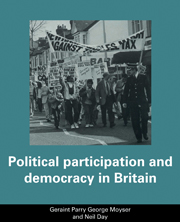Book contents
- Frontmatter
- Contents
- List of figures
- List of charts and maps
- List of tables
- Preface
- Part I Theories and methods
- 1 Participation and democracy
- 2 The study of participation and its political context
- Part II Patterns and pathways
- Part III Issues and actions
- Part IV The local process
- Part V Conclusions
- Appendix A Survey methods
- Appendix B Measuring elite-citizen concurrence
- Appendix C The National Questionnaire
- Endnotes
- Bibliography
- Index
2 - The study of participation and its political context
Published online by Cambridge University Press: 03 May 2011
- Frontmatter
- Contents
- List of figures
- List of charts and maps
- List of tables
- Preface
- Part I Theories and methods
- 1 Participation and democracy
- 2 The study of participation and its political context
- Part II Patterns and pathways
- Part III Issues and actions
- Part IV The local process
- Part V Conclusions
- Appendix A Survey methods
- Appendix B Measuring elite-citizen concurrence
- Appendix C The National Questionnaire
- Endnotes
- Bibliography
- Index
Summary
The context
Participation is, we have argued, one major theme in democratic theory. But it is not a paramount concern of all versions of democracy. Some theories of democracy place greater emphasis on accountability to the electorate than on the political involvement of the citizens. Accordingly, it is not surprising that the importance of participation in political debate can vary from period to period as different views of democracy rise and fall in favour. It is, therefore, necessary to say something about the salience of participation in the 1980s when our survey was undertaken.
The term ‘participation’ came rapidly to the fore in the politics of many Western democracies, including Britain, in the 1960s. The circumstances in which participation became a political slogan are relatively easy to describe. It is less easy to explain the reasons why there occurred such a convergence of conditions in which the call for greater citizen involvement seemed appropriate. By the middle 1960s the West had, since the end of the Second World War, experienced twenty years of the greatest general increase in material standards of living ever recorded. In Europe, at least, this had been led by a bureaucratically organised state in association with corporate capitalism (Shonfield 1965). Some reflective politicians, such as Anthony Crosland, whilst acknowledging the need for consultative institutions at the neighbourhood level, concluded that material contentment would permit ordinary persons to devote greater attention to their growing leisure interests and be, quite properly, less concerned with interfering with the lives of others through political participation (Crosland 1975:89).
- Type
- Chapter
- Information
- Political Participation and Democracy in Britain , pp. 23 - 36Publisher: Cambridge University PressPrint publication year: 1992



